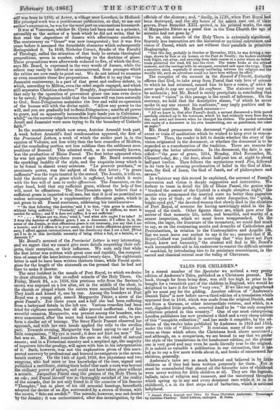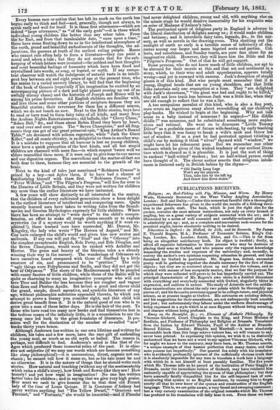TALES FOR CHILDREN.* Is a recent number of the Spectator
we noticed a very pretty edition of Andersen's Tales, published as a Christmas present. The book, though far from being dear, was still too high in price to be bought for a twentieth part of the children in England, who would be delighted to have it for their "very own." If we like our gingerbread gilt we must pay for the gilding. Another edition of "Andersen's. Danish Tales" is now before us—a third edition of a translation which, appeared first in 1816, which was made from the original Danish, and not from a German, or other intermediate version, and which, in a curt, dignified little preface, asserted itself to be "the only complete collection printed in this country." One of our most enterprising London publishers has now produced a third and a very cheap edition, of this "complete collection ;" and has made it completer, by the ad- dition of the twelve tales published by Andersen in 1862 and 1853, under the title of "Histoner." It contains many of the same pic- tures as those which adorn the Christmas book above mentioned;. and although, on a comparison, we are bound to say that we prefer- the style of the translations in the handsomer edition, yet the plainer one is very good and may even be made literally true to the original. It is indeed so valuable a publication in our estimation, that it lies led us to say a few more words about it, and books of amusement for children, generally. Andersen's tales are as much beloved and believed in by little children as if they had been written purposely for them. For it must be remembered that almost all the favourite tales of childhood were never written for little children at all. They are the legends, ballads, tales of religion and romance, and the untutored thoughts which spring up in any and every dominant race while it is in Its childhood, i. e. in its first steps out of barbarism, which is national babyhood.
• Danish Fairy Legends and Tales. By Mall] Christian Andersen. Tranalat9d by Caroline Peachey. Third Edition, enlarged. H. Bohn.
Every human race or nation that has left its mark on the earth has begun early to think and feel—and, generally, though not always, to speak early and well for itself. It is these first utterances—which are indeed "large utterances," as "of the early gods"—it is these which individual young children like better than any other tales. From the far East, and from that incalculable date, once upon a time," there have come floating down to us in the intellectual atmosphere of the earth, grand and beautiful embodiments of the thoughts, the ad- jurations, the guesses at truth of the earliest ruling people. Races who cannot rule often help to form a literature—they can point a moral and adorn a tale- but they do not create that for the safe- keeping of which letters were invented—the noblest and best thoughts
and most beautiful feelings of humanity which have been fixed and crystallized into words, as song, or legend, or myth. If any compe- tent observer will watch the indulgence of natural taste in an intelli- gent boy between six and eight years of age at the present time, who has access to a varied nursery library, he will find that the beginning of the book of Genesis (especially if his imagination be excited by an accompanying picture of a dark and light planet coming _up out of an awfully stormy chaos) and the histories of Joseph and Moses will be among his prime favourites. All English children are familiar with, and love these and some other portions of scripture because they are beautiful stories; their reverence for them has a different source, which we do not touch on now. Next to the Bible stories, boys love to read or have read to them fairy tales of all kinds, and many from the Arabian Nights Entertainments; old ballads, like "Chevy Chase," "Adam Bell," &c., and those about Robin Hood they learn by heart, or read over and over again. The "Seven Champions," and all frag- ments they can get of our great primeval epic, "King Arthur's Round Table," are devoured with solemn eag,emess, while "Jack the Giant Killer," and all comic chivalry, is as delightful to them in another way. It is a mistake to suppose that all humour is lost on young children, some have a quick perception of the best kinds, and all but stupid children are charmed with mere fun—in which respect 'twere well we elders resembled them more, if it were only to give tone to our nerves and our digestive organs. The marvellous and the matter-of-fact are both dear to them, because they are essential to the growth of the brain.
Next to the kind of tales just mentioned "Robinson Crnsoe" is prized by a boy—not before them, if he have had a chance of familiarizing himself with them first. "Robinson Crusoe," and "Peter Wilkins," and "The Pilgrim's Progress," will live for ever in the libraries of Little Britain, and they were not written for children any more than the earlier literature we have instanced. A. few years will show distinctly to all interested in the matter, that the children of every cultivated generation show a keen delight in the earliest literature of intellectual and conquering races. Quite recently learned men have taken to writing tales from the Scandi- navian and Grecian Mythologies expressly for little children.. Where there has been no attempt to "write down" to the child's com re- bension, no effort to make all rough places smooth or to explain mysteries (as if a mystery would be worth anything if it were ex- lained !), these learned men have succeeded. Mr. Dasent, Mr. Iingsley, the lady who wrote "The Heroes of Asgard," and Mr. Cox have enlarged the child's world and given him new nectar and ambrosia. If any one will put the "Iliad" and the "Odyssey" into the simplest paraphrastic English, Erie Percy, and Erie Douglas, and the Seven Champions, would soon be ranked with Achilles and Hector. The grace and beauty of the Grecian tales a e already winning their way in the nursery. The wanderings of Odysseus we have ourselves heard compared with those of Sindbad by a little creature of six, and pronounced to be "prettier." The only "ugly things were Polyphemus and Scylla, and they did not get the best of Odysseus." The shore of the Mediterranean will be peopled with sunny fancies of little children, while those of the Baltic will be quite as charming to many an imaginative youngster who will not love Thor and Baldur the less because they are rougher and vaguer than Zeus and Phcebus Apollo. Set before a good and clever child the grand, simple, direct narrative, and symbolic literature of any age, without philosophic subtleties appended thereto, by which you attempt to prove a theory you consider right, and that child will derive great benefit from it. It is the natural good of one who is to grow into a man of these latter days. He is the heir of the past. To those who have read too many new books and find themselves lost in the tedious mazes of the infinitely little, it is a consolation to see the young ones led back to the great fountains of literature. It pro- mises well for the diminution of the number of so-called "new" books thirty years hence. Although Andersen has written in our own lifetime and written for children, his tales and a few more, have the rare gift of enthralling the young soul, as much as an old myth or ballad. The reason is, perhaps, not difficult to find. Andersen's mind is like that of the Ages which produced those immortal relies of the past. It is objec- -live not subjective (if we may use words which are become something like slang philosophicap—it is unconscious, direct, organic not me- chanic; .he cannot tell how it came so, but so his tale must be and no otherwise. It is in the nature of things that he should write such stories. How natural and touching (without any of the sentimentality which ruins a child's story), how fresh and flower-like they are ! How homely ! and yet how regal in imagination ! No one has written better tales for children; and in saying that we give very high praise. Nor must we omit to give honour due to that dear old French lady of the time of Louis Quinze. if la Comtesse d'Auluoy had never written anything but "The Yellow Dwarf," "Gracious and Fercinet," and "Fortunio," she would be immortal—and if Plauche had never delighted children, young and old, with anything else on the mimic stage he would deserve immortality for his exquisite miss en scene of Madame d'Aulnoy's tales.
The puritanical spirit of religious party in England is adverse to the liberal distribution of delights among us ; it would make children sad betimes; and it interdicts fairy tales, legends, &c., in the nur- sery, as well as novels in the drawing-room. This shutting out the sunlight of earth so early is a terrible cause of inferiority of cha- racter among our larger and more bigoted sects and parties. Col- lects, and catechisms, and Sunday tracts, are poor fare alone for an imaginative child. However, they will leave him the Bible and the "Pilgrim's Progress." Out of that he will get support. Some persons, who do not know much of little children, are apt to be alarmed for their morals at this and that act and sentiment in a story, which, to their wise and adult apprehension, appears totally wrong—and yet is crowned with success. Jack's deception of stupid giants is of this kind. But wise people must remember that it is young, illogical heads that are on young shoulders, and that little folks entertain only one conception at a time. They "are delighted with Jack's cleverness," "the giant was bad and ought to be killed," they will not love truth less because Jack was a little liar, when they are old enough to reflect that he was a liar. A too scrupulous moralist of this kind, who is also a fine poet, once wrote an ingenious essay about remodelling all our children's play-books. He wished to begin at the beginning. Why not talk sense to a baby instead of nonsense ? he argued—" Hie diddle diddle !" was nonsense, and he substituted something more eupho- nious and rational. He went on to denounce "Little Tommy Dilvee' as a probable cause of future wife-beating, by early teaching little boys that it was funny to break a wife's neck and throw her out of window. If as a poet he had protested against vitiating a child's ear by making it think "silver" rhymed with "window," we might have let his refinement pass. But we remember one other instance which he gives of the wicked tendency of our earliest litera- ture which is absurd as it is plausible. It is just the sort of thing to enchant "half-witted" readers ; but no half-witted person could have thought of it. The clever author asserts that religious intole- rance is fostered early in British babies by the rhyme-
" Old Daddy Long Legs
Won't say his prayers. Then, take him by the left leg And throw him down stairs."































 Previous page
Previous page